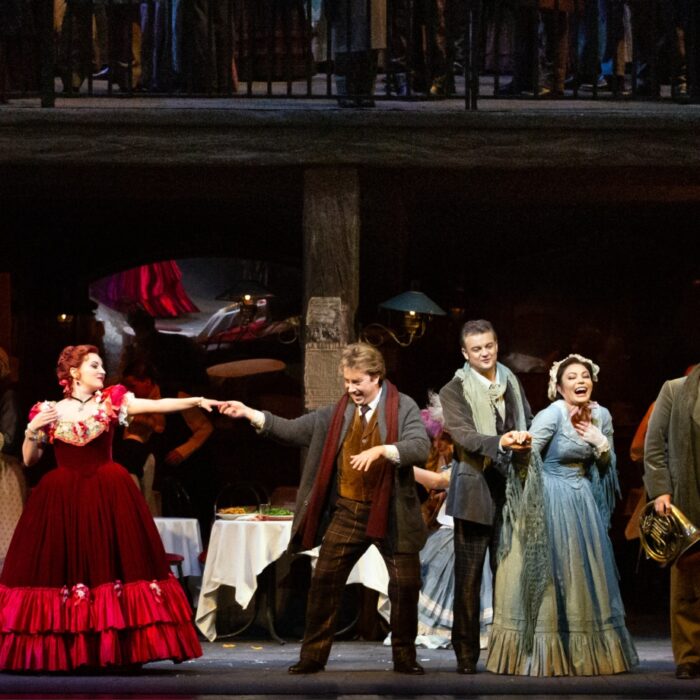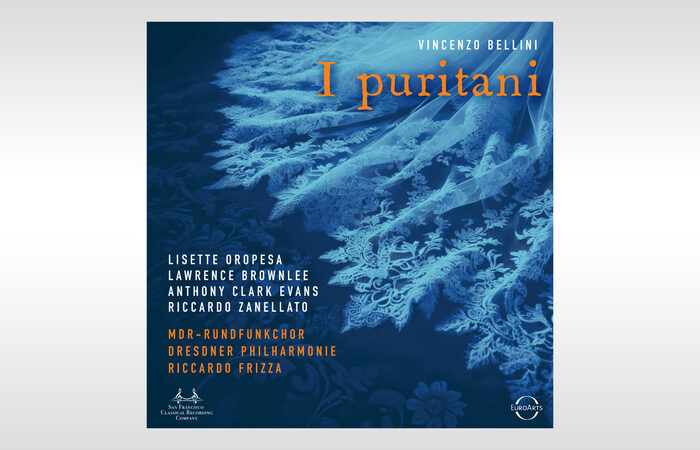
Wexford Festival Opera 2023 Review: La Fille du régiment
An Enthusiastic Cast and Creative Team Present an Afternoon of Laughter
By Alan Neilson(Photo: Padraig Grant)
The second of Wexford Festival’s pocket operas, Opera Beag, was a presentation of Donizetti’s opéra-comique “La Fille du régiment.”
Operating on a low-budget and using only piano accompaniment, director Heather Hadrill was under no illusions of the difficulties involved. In her program notes, she stated “The challenge of pocket operas is to give as full a sense as possible of the story and music without the resources of the big stage.” Not that this was an attempt at preparing the ground for an underpowered production.
On the contrary, it was a simple recognition of the fact, one that she was fully prepared to deal with. As she went on to explain, “It provokes us to be bold in our thinking, simple, and striking in our gestures and imagery.” The result was a snappy production that positively raced along with the audience caught in its tailwind, and they loved every minute of it.
A Colorful & Lively Staging
The story concerns an abandoned baby who is adopted by a regiment of soldiers. Although she grows up without a mother or siblings, she has plenty of fathers. In true comic style, her mother the Marquise de Berkenfeld, posing as a long-lost aunt, turns up to whisk her off to her stately home in attempts to take control of her life. Add in a love interest in the form of Tonio, and everything is set for the usual comedic shenanigans.
Hadrill shifted the setting from Switzerland to the North African desert and identified the regiment specifically as the Zouave, a French regiment known for its fancy uniforms and for the fact that it “adopted” women to serve as nurses and cooks. This proved to be a clever device for adding color to the production. Lisa Krugel’s costume designs were surprisingly ornate for such a low-budget production; the soldiers’ light blue and gold jackets paired with red trousers and hats made a strong impression, while Tonio was able to parade around in typical Arabic clothing. The scenery, also designed by Krugel, was very basic, although very effective. The aluminum bins with mustaches and red hats added to the sense of fun.
Maksym Diedov’s lighting designs played up the idea of the action being set in the North African desert by bathing the performance area in a warm, bright light. This also worked well in promoting the energy and positivity with which the cast engaged with the work. In fact it was very noticeable, the extent to which the singers were on board with Hadrill’s interpretation. They seemed to be genuinely enjoying the experience, enthusiastically hamming it up for all its worth with their “striking gestures,” facial expressions and energetic movement.
At the centre of the drama, Hadrill identified the contradictory impulses operating in Marie. When part of the regiment, she is independent and “proud and content to defend her family on the battlefield.” But when she is taken away to become a lady, she becomes “insecure and helpless.” Although not too much was made of the fact, it did allow Marie to be portrayed with an element of depth rather than as a stock character.
Although the piece was sung in French to a text by librettists Bayard and Vernoy de Saint-Georges, the dialogue was in English. But the program made no mention of its English translator. It was, however, very witty and had everyone laughing out loud.
A Fully Engaged & Enthusiastic Cast
The daughter of the regiment, Marie, was given an enthusiastic and lively presentation by soprano Corina Ignat. She possesses a versatile, attractive voice with a sparkling, with a bright upper register. She sang with plenty of confidence. Her phrasing was animated and spirited, while her coloratura was suitably florid and displayed a pleasing agility. She was prepared to take risks, which, even if they did not always come off, is always good to see in a singer. Likewise, her acting was engaging, and she appeared to genuinely enjoy the lively antics of the pacy staging. She adapted Marie’s character successfully to the changing circumstances with her Act two reflective recitative and aria, which enabled her to show off the more subtly expressive side of her voice
Tenor Chris Mosz in the role of Tonio made for an ardent lover. He used his sweet-sounding, lyrically strong voice to successfully define his passionate character. His voice also possesses an impressive degree of versatility, which allowed him to effortlessly extend the vocal line and move gracefully into the upper register. His aria, “pour mon âme quel destin!,” known for its high tessitura with its succession of high C’s, was taken in stride.
Baritone James Wafer produced a confident performance in the role of Suplice, one of Marie’s “fathers,” who is very protective of her interests. In what was an excellent and clearly defined portrayal, he successfully brought out the depth of his feelings for Marie. His singing perfectly captured these emotions through clear articulation, well-constructed phrasing and emotional strength. He was able to infuse all of this into the vocal line.
Carolyn Dobbin clearly loves the stage. She is a superb actress, and on the evidence of this performance, she is a natural comedienne too. At one point, she even forgot her lines, which she quickly turned into a joke and had the audience laughing. It really did appear to be part of the performance! Unsurprisingly, she was able to draw out the full comic potential of her role with a larger-than-life interpretation as the Marquise de Berkenfeld, which she turned into a laugh a minute. Her ability to fashion the voice to develop the comedy was excellent.
All the smaller roles were well cast. Bass Connor Baiano was an energetic and amusing Hotensius. Mezzo-soprano Judith Le Breuilly convinced as the mean-spirited Duchesse de Crackentorp. Bass-baritone Meilir Jones caught the attention with his well-sung reading of the corporal, while tenor Stephen Walker created a good impression as a soldier.
Musical director and pianist Rebecca Warren’s accompaniment was rhythmically pleasing and sensitively attuned to the onstage drama.
The good-humored chattering from the audience as they left the theatre said it all. This was comedy opera at its best. It was more than just the occasional laugh and amused smile; it was pure, concentrated fun.



